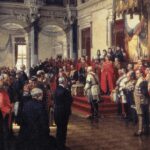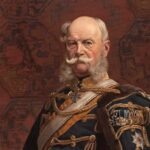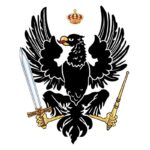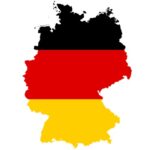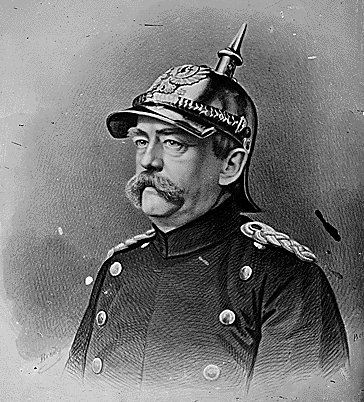 Under the “Iron Chancellor”, Otto von Bismarck, Germany grew from a loose confederation of weak states to a unified powerful empire. His smart and dashing way of making politics (winning three wars in eight years!) led to the extension of German borders and the rapid growth of German industry.
Under the “Iron Chancellor”, Otto von Bismarck, Germany grew from a loose confederation of weak states to a unified powerful empire. His smart and dashing way of making politics (winning three wars in eight years!) led to the extension of German borders and the rapid growth of German industry.
Bismarck was born on April 1, 1815, in the aristocratic family of estate owners at Schoenhausen in Prussia. He went to the prestige school in Berlin, and then studied law in Hanover. Bismarck was not an outstanding student, and spent much of his time drinking with his fellows in an aristocratic fraternity. After the university he enrolled into the Prussian civil service where he did not stay long because of the boredom inevitably cast by the bureaucracy. He didn’t appear in the politics till 1847. Meanwhile, he spent 8 comfortable years helping his father manage the estate. He also married Johanna von Puttkamer in these years. His wife came from a conservative aristocratic family, which was greatly to Bismarck’s liking, who later entered German politics as an archconservative. The marriage was a very happy one.
Bismarck’s political views in the beginning of his career were those of a typical country squire. He soon joined the conservative Gerlach group who stood for the noble estate and defended it from the bureaucratic centralization. When the democratic revolutions swept across Europe and reached Berlin in 1848, his first impulse was to arm the peasants of his estate in defense of King and the country. However in a very short time he realized that being principled and tradition-bound like the reactionary Gerlach group was not enough. At that time Bismarck’s ideas became very pragmatic, and concrete interests plus the power to defend them were his chief care. In 1849 he was elected to the Prussian Chamber of Deputies. When the democratic revolution in the central Europe was defeated, Bismarck, despite his archconservative ideas, was not willing to maintain the status quo according to which Austria preserved its hegemony in the German Confederation. Bismarck’s goal was to make Prussia the dominating power in Germany and the northern Europe. To achieve this, he was ready to start a war with Austria.
After having served as a Prussian ambassador in Russia and France for 11 years, Bismarck was appointed the prime minister and minister of foreign affairs of Prussia in 1862. During next 4 years in the office Bismarck implemented serious military reforms and announced that Prussia could use its military force for achieving national unification. In 1865 a quick and successful war between Prussia and Denmark solved the old conflict over the duchies of Schleswig and Holstein. According to the Convention of Gastein, Schleswig from then on was to be administered by Prussia, and Holstein – by Austria. Next half the year Bismarck dedicated to the negotiations with Austria about giving up the dominance in Germany. As before, Bismarck’s main goal was to make Prussia dominate in Germany. His peaceful efforts to solve the problem failed, and there was the last way remaining: not by speeches and resolutions, but by blood and iron.
In the middle of 1866 Prussian army entered Holstein, Austria sent its own troops to fight with the Prussians, and within a few weeks Austria was defeated. The whole Europe kept wondering how Prussia managed to put Austria off the German throne in such a short time! As a result, according to the Peace of Nikolsburg, Hanover, Hesse-Kassel, Nassau, and Frankfurt were annexed to German confederation.
Related articles:
Otto von Bismarck: The Iron Chancellor
Lost German Kingdoms: Forgotten States and Their Cultural Influence
Bismarck and his Empire
Bismarck and the Unification of Germany
